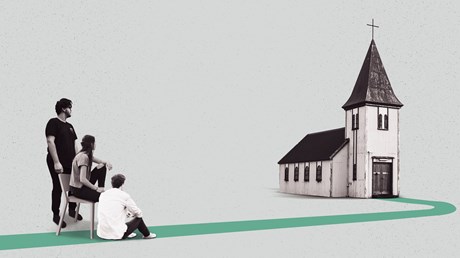Unlike ‘Nones’ and ‘Dones,’ most ‘Umms’ want to return to church—but they feel stuck.

For the first time in my nearly 40 years, I do not belong to a church body.
Each Sunday I awake with a longing to gather around song, Scripture, and sacrament. Most of those mornings my wife and I walk to the nursing home to celebrate the Eucharist with a faithful but forgotten few.
This year my wife and I want to plant a church in Chicagoland, but many weeks I am left wondering, Where do we fit in?
Recently, I was lamenting this season with a friend. He echoed my sentiment, “I’m also floating without a church—it isn’t ideal, just the way it is.” Our exchange wasn’t significant, just two friends consoling each other through ecclesial purgatory. Later that week, I heard similar thoughts repeated by my neighbors who are new parents.
Again, this sentiment was echoed by a friend who works at a large Christian nonprofit. Over text messages and phone calls, my old roommate and my denominational executive repeated a similar status. But what really caught my attention is when I heard my students and colleagues at Northern Seminary describe themselves and their congregants in much the same way.
All expressed a strong commitment to Jesus and a desire to be part of the church, but they are not active in a local congregation. This growing segment of believers is what I am labeling the “umms.”
Dones, nones, and umms
COVID-19 has been described as a global x-ray, revealing what was hidden in our systems and relationships all along. To be more precise, COVID-19 seems to be an accelerated x-ray, revealing and amplifying these hidden truths at an expedited pace.
Acquaintances became strangers as relational ties grew strained. Economic inequalities became glaringly obvious. ...
from Christianity Today Magazine
Umn ministry


.gif)

.gif)
.gif)
